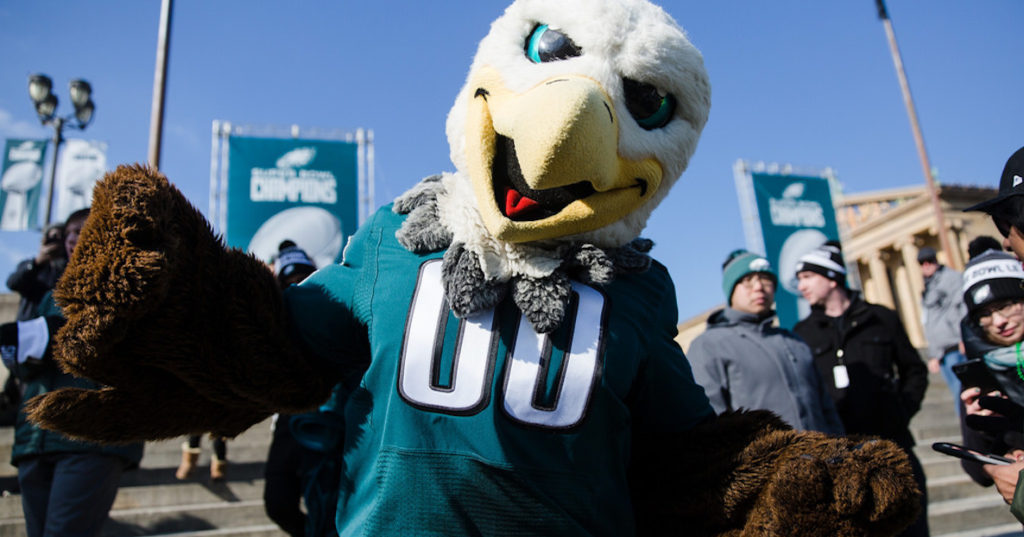Following in the tradition of Connor Barwin and Malcolm Jenkins, former All-Pro wide receiver and current Eagles broadcaster Mike Quick will write weekly for The Citizen this season, analyzing what the Birds will have to do each week on the field to emerge victorious. We’ve paired Quick with Professor Richardson Dilworth, Director of Drexel University’s Center for Public Policy, who will analyze how Philly stacks up off-the-field against the city we play each week. Dilworth, who knows nothing about football, is arguably Quick’s most unlikely teammate ever.
Mike Quick’s On-Field Scouting Report: Everyone is talking about how great Nick Foles played in last Sunday’s upset win over the Los Angeles Rams, but it wasn’t just Nick who rose to the occasion. The whole team played with a renewed sense of urgency. As good as Foles was, the key was how well the defense played against an offense that has been a juggernaut most of the season.
They’ll have to do the same thing this week against the Houston Texans. The defense will have to contain the Texans’ young quarterback Deshaun Watson. He’s really tough. Unlike most quarterbacks, he’s an extension of their run game. Which means the Eagles defense will have to make him throw from the pocket. When he scrambles around, Houston makes big plays. That said, he’s been the most sacked quarterback in the league this season, and when he’s under pressure he has a tendency to cough the ball up. Last week, the Eagles defense forced turnovers and they’ll have to do the same on Sunday.
When the Eagles have the ball, they’ll have to block the Texans’ two dynamic pass rushers, J.J. Watt and Jadeveon Clowney. The two of them can wreck an entire ballgame. If the Eagles can keep these two away from Nick Foles, the Birds should have a real shot at keeping this unlikely late season playoff push alive.
The final key this week is…you! This is the Eagles’ last home game and the home crowd really can make a difference. Look for Eagles fans to be that all-important 12th man on the field.
Prof. Richardson Dilworth’s Off-Field Scouting Report: First of all, Houston, as the home of NASA’s mission control center, kind of just wins on that by itself.
Second, Philadelphia beats Houston in most of the ways we might expect. Houston is geographically humongous (600 square miles) with a population density less than one-third of that in Philadelphia. So it’s no surprise that fewer people bike to work in Houston. Everyone pretty much agrees that Houston is incredibly diverse, as also reflected in the scores—the generally reputable Migration Policy Institute identified Houston as the “most diverse metropolitan region” in 2015. Philadelphia has become more diverse but certainly the scores indicate that Houston beats us in this regard.
Houston has also grown a good deal faster than Philadelphia over the past decade. The Census estimates that approximately 200,000 more people live in Houston in 2018 than lived there in 2010. For Philadelphia, the similar increase is approximately 55,000 people. And there are some good reasons to move to Houston instead of Philadelphia.
Houston is slightly cheaper (median gross rent was $30 less in Houston than in Philly for 2013-2017) and higher median incomes in Houston ($49,000 vs. $41,000 in Philly for 2013-2017) suggest that it is easier to get a job (more competition for workers ups incomes). You’d think maybe it would more pleasant to live in Philadelphia because Houston would be pretty hot in the summer, but average summer temperatures are only slightly higher in Houston than in Philadelphia. And because Philadelphia is more dense and has less park space (the fact that Houston beats us on park space is pretty exceptional for a Sunbelt city), our city likely suffers more from the “heat island” effect, whereby heat is trapped in the built environment, raising average temperatures.
One thing we do beat Houston on is economic inequality—which is surprising given that Philadelphia has a higher poverty rate (though not much higher—26 percent in Philly vs. 21 percent in Houston). And a few years ago Philadelphia would probably have had more economic inequality than Houston. Yet over the past four years, Houston is among the very top metro areas in the U.S. in terms of the growth in economic inequality, right between Los Angeles and Baltimore (note that this is for metro area, not city proper). In absolute terms, the Houston metro is one of the top 10 areas in terms of economic inequality (the measure here is the ratio between the incomes of those at the 95th and 20th percentile income distributions, and it can be found here.
Yet Philadelphia doesn’t really have much to be proud of in terms of economic performance. In part the reason that Houston beats us for increasing economic inequality is because more people have become wealthier in Houston while more people have become poorer in Philadelphia, which drags down our median income rate—with no real corresponding increase in wealth at the upper tiers.
These data don’t actually mean that specific people have become poorer in Philadelphia. It may be that poorer people have just moved into the city and people with more money have moved out. Either way, I’m somewhat doubtful about declaring victory here, but I guess I’ll take what I can.

